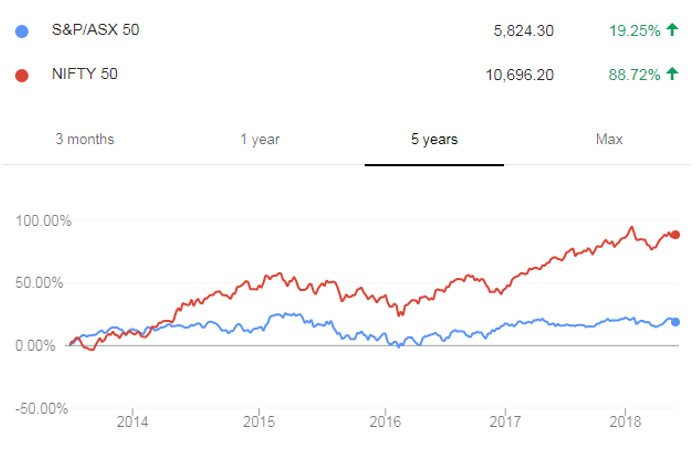Should you invest in India?
This is was the topic at my desk last week.
A colleague of mine thought it was a capital idea. And I thought, why not? Successful investing usually works everywhere. So why wouldn’t it work in India?
This got me thinking.
Buying companies for less than they’re worth on the NZX is a great way to build wealth over time. Doing the same in places like India, China and other emerging markets, you can make a fortune that much faster.
Is it because emerging markets have great growth prospects? Are investors more eager to bid up stocks in place like India or China rather than down under?
There are two reasons in my mind.
India’s 50 beat Australia’s 50
The first is information.
In many emerging markets, key information is not always spread amongst the public. This information gap gives those with information a huge advantage.
Along with this first point, a lot of investors might not look or study information that’s available to them.
With an annual report at arm’s reach, they’d rather choose stocks the media likes or stocks already rising.
The second is the maturity of investors.
It’s possible you won’t see the Dow or the ASX 200 drop 50% for decades to come. Now, I’m not making a judgement call on debt or the price of stocks today. But if US or Aussie stocks drop significantly, there’s enough savvy buyers to prevent quality stocks from falling too far.
Investors know a winning strategy is to buy good businesses cheap.
[openx slug=inpost]
But in markets like China, Indonesia or India the stories are a little different.
In China for example, some investors care about the name of the company they invest in. They either like the sound of it, or the company has ‘emperor’ or ‘king’ in their name.
In India, investors tend to sell their winners and hold onto losers when the far better option is to sell losers quickly and hold onto winners.
So for savvy investors like Mohnish Pabrai, markets like India are a dream. It’s a place where they can really clean up!
In an interview with ET Now, Mohnish said:
‘…I am bullish on the US in general, it is just that things are not heavily mispriced and under-priced. At the same time, India has increased quite dramatically. It has gone from basically less than a $100 million two-three years ago, to over $400 million and so all of that has happened because I am able to find opportunity here and I am not able to find opportunity in US.’
Now take a look at the graph below. It shows the NIFTY 50 (largest 50 companies in India) and the ASX 50 (largest 50 companies in Australia).
The five year average return across the top 50 players in India would have almost doubled your money. You would have earnt less than 20% holding the top 50 stocks on the ASX over the same time.

Source: Google Finance
[Click to open new window]
Stretch the date back to 2006, and your money more than triples in India but grows by less than 19% in Australia.
It doesn’t exactly inspire domestic stocks.
But while it might be easier to find undervalued stocks in an emerging market, it doesn’t mean you can’t find gems on the ASX too.
The war on short-termism
Two billionaires, Jamie Dimon and Warren Buffett want businesses to stop providing a quarterly earnings guidance.
Yep, you read it right. They want investors to have less information.
‘Quarterly earnings guidance often leads to an unhealthy focus on short-term profits at the expense of long-term strategy, growth and sustainability,’ the two said.
The Australian Financial Review picks up the story.
‘They have said the practice of telling Wall Street what to expect from earnings can distort management’s priorities. In the latest appeal, they said companies often hesitate to spend on technology, hiring, and research and development to meet quarterly earnings forecasts that can be affected by seasonal factors beyond their control.
‘Dimon has blasted excessive reporting requirements and the short-term focus of quarterly earnings. At JPMorgan’s investor day in February, he called on companies to stop providing the guidance, saying earnings are hard to predict and companies have an incentive to fudge numbers. Buffett has echoed the idea that guidance can lead to corporate misbehaviour.’
So yes, Dimon and Buffett want investors to have less information. But its information which is arguably just noise.
Even if firms were to stop quarterly estimates, I still believe most investors would think 12-months or less.
If you’re willing to extend your time horizon, immediately you’re at a huge advantage. You don’t have the go through the arduous process of estimating sales and earnings to the dollar within the next three months.
Instead you can make a judgement call. What will earnings look like years from now? Then you can access whether the stock is trading at an attractive price to future earnings.
A longer time horizon won’t put you on investment easy street. But it does give you a leg up on most other investors today.
Your friend,
Harje Ronngard





Harje Ronngard is one of the editors at Money Morning New Zealand. With an academic background in finance and investments, Harje knows how difficult investing is. He has worked with a range of assets classes, from futures to equities. But he’s found his niche in equity valuation. There are two questions Harje likes to ask of any investment. What is it worth? And how much does it cost? These two questions alone open up a world of investment opportunities which Harje shares with Money Morning New Zealand readers.